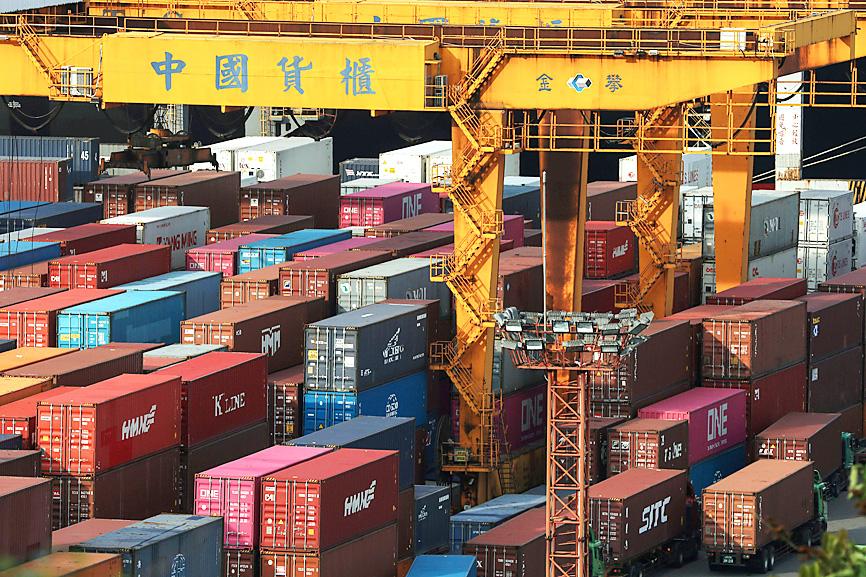The nation’s exports last month slid 3.8 percent from a year earlier to US$27.13 billion, as poor shipments of mineral, chemical and plastic products eclipsed record semiconductor sales, the Ministry of Finance said yesterday.
“Despite rebounds in international oil and raw material prices, demand for related products remained sluggish,” Department of Statistics Director-General Beatrice Tsai (蔡美娜) told a news conference in Taipei.
That was the reason shipments of mineral products plunged a record 65.5 percent, while shipments of chemical, base metal and plastic products declined 25.3 percent, 23.8 percent and 23.4 percent respectively, Tsai said.

Photo: Ann Wang, Reuters
Price factors aside, a languid global economy caused by the COVID-19 pandemic continued to weigh on demand, she said.
However, sales of electronic components were strong, increasing 23.9 percent to US$11.18 billion, with semiconductor shipments jumping 27.4 percent to US$10.25 billion, moving above US$10 billion for the first time, Tsai said.
The COVID-19 crisis spurred demand for devices used in remote working, learning and entertainment, Tsai said, adding that front-loading by China’s Huawei Technologies Co (華為) likely also supported semiconductor shipments.
Washington recently imposed new restrictions on the Chinese company’s use of US technology and equipment, which do not affect orders previously placed with Taiwanese suppliers.
Imports fell 8.6 percent to US$22.29 billion last month, as local firms cut back on imports of raw materials and capital equipment by 11.3 percent and 3.2 percent respectively, the ministry’s report showed.
The small decline in imports of capital equipment was no reason to worry, Tsai said.
Taiwan last month had a trade surplus of US$4.84 billion, an annual increase of 26.6 percent.
For the second quarter, exports shrank 2.4 percent from a year earlier to US$79.35 billion, while imports dropped 4 percent to US$67.52 billion.
Outbound shipments would remain in contraction mode this month, dropping 1.5 to 4 percent, Tsai said, hesitating to bet on seasonal movements, citing poor order visibility.
Companies in the 5G network deployment, laptop and data center supply chains are looking at a robust third quarter, but vendors of smartphone parts have adopted a conservative attitude.
Shipments to China last month increased 13.8 percent and those to the US rose 3.7 percent, thanks to tech sales, but trade with Japan, ASEAN members and Europe dropped by double-digit percentages, as economies are struggling to recover from the virus outbreak, the ministry said.
For the first six months, exports increased 0.5 percent from a year earlier to US$158.02 billion, while imports slipped 0.4 percent to US$136.67 billion, it said.

Sweeping policy changes under US Secretary of Health and Human Services Robert F. Kennedy Jr are having a chilling effect on vaccine makers as anti-vaccine rhetoric has turned into concrete changes in inoculation schedules and recommendations, investors and executives said. The administration of US President Donald Trump has in the past year upended vaccine recommendations, with the country last month ending its longstanding guidance that all children receive inoculations against flu, hepatitis A and other diseases. The unprecedented changes have led to diminished vaccine usage, hurt the investment case for some biotechs, and created a drag that would likely dent revenues and

Macronix International Co (旺宏), the world’s biggest NOR flash memory supplier, yesterday said it would spend NT$22 billion (US$699.1 million) on capacity expansion this year to increase its production of mid-to-low-density memory chips as the world’s major memorychip suppliers are phasing out the market. The company said its planned capital expenditures are about 11 times higher than the NT$1.8 billion it spent on new facilities and equipment last year. A majority of this year’s outlay would be allocated to step up capacity of multi-level cell (MLC) NAND flash memory chips, which are used in embedded multimedia cards (eMMC), a managed

CULPRITS: Factors that affected the slip included falling global crude oil prices, wait-and-see consumer attitudes due to US tariffs and a different Lunar New Year holiday schedule Taiwan’s retail sales ended a nine-year growth streak last year, slipping 0.2 percent from a year earlier as uncertainty over US tariff policies affected demand for durable goods, data released on Friday by the Ministry of Economic Affairs showed. Last year’s retail sales totaled NT$4.84 trillion (US$153.27 billion), down about NT$9.5 billion, or 0.2 percent, from 2024. Despite the decline, the figure was still the second-highest annual sales total on record. Ministry statistics department deputy head Chen Yu-fang (陳玉芳) said sales of cars, motorcycles and related products, which accounted for 17.4 percent of total retail rales last year, fell NT$68.1 billion, or

In the wake of strong global demand for AI applications, Taiwan’s export-oriented economy accelerated with the composite index of economic indicators flashing the first “red” light in December for one year, indicating the economy is in booming mode, the National Development Council (NDC) said yesterday. Moreover, the index of leading indicators, which gauges the potential state of the economy over the next six months, also moved higher in December amid growing optimism over the outlook, the NDC said. In December, the index of economic indicators rose one point from a month earlier to 38, at the lower end of the “red” light.